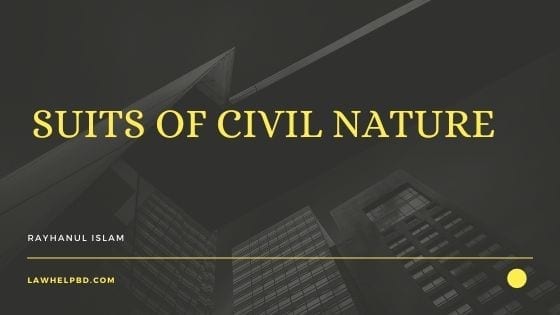Suits of Civil Nature [CPC 02]
There are several paths that you can choose if your rights get violated. among the other, the main two branches of law are Criminal Case and Civil Suit. Generally, a person can choose between a criminal case and a civil suit. Criminal case punishes the wrongdoer by imprisonment and fine on the other hand civil suit orders for compensation or specific relief. To start a civil suit the subject matter or suit must be a suit of civil nature, therefore it is important to understand the term Suits of Civil Nature. The Code of Civil Procedure, 1908 deal with suits of civil nature. Let’s have a look into it.
Suits of Civil Nature
Suits of civil nature is a very wide expression and not exhaustive in any law. However, some light can be casted on this topic based on The Code of Civil Procedure, 1908 [Hereinafter mentioned as “CPC”]. In CPC suits of civil nature means a suit that is presented before a Civil Court for adjudication of a civil matter, more specifically to determine the right of property or office.

Suits of Civil Nature
Here in both phrases, “right to property” and “right to office” deserves more clarification. “Right to property” means and includes movable, immovable, intellectual, inheritable property and property that arise out of any contract, agreement, litigation, or out of any other civil rights. As opposed to, “right to office” means a right to hold a position and exercise the power of that position. It could be a job post, a religious, or any secular post.
Section 9
Provisions relating to “suits of civil nature” have been laid down in section 9 of CPC. It reads “Court shall have the jurisdiction to try all suits of civil nature except those of which their cognizance is expressly or impliedly barred.”
In the landmark case, Shankar Narayan Potti v K Sreedevi, (1998) 3 SCC 751 the apex court held that ”it is obvious that in all type of civil dispute civil courts have inherited jurisdiction as per section 9 of the CPC unless a part of Jurisdiction is carved out from such jurisdiction, expressly or by necessary implication by any statutory provision conferred on any other tribunal or authority.”
Civil Suit examples
Following are the suits of civil nature
- suit relating to property.
- suit for damage of civil wrong.
- suit for Specific Relief.
- suit for damage for breach of contract.
- suit for rent.
But these are not suits of civil nature,
- A suit for a declaration of a member of caste refrained from invitation to a caste dinner.
- A suit for expulsion of a member from caste.
- Suits involving purely religious ceremonies.
Hope this article will help you to choose you the preferred court for your civil suit. For more step by step guideline stay with us, we will be publishing the step by step guideline of a civil suit.




Very nice sir